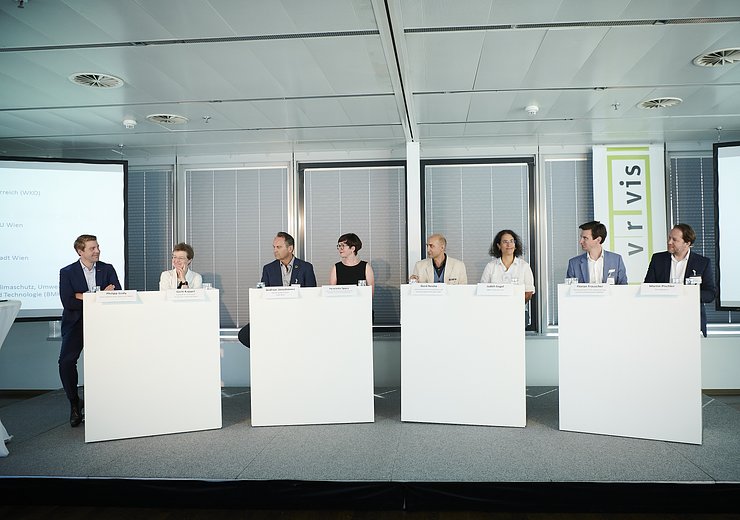Austria’s Future in Green IT
Dean Gerti Kappel discussed sustainability and tech in an expert panel with research, politics, and industry leaders.

Picture: Martin Hörmandinger / APA
The UN’s global development goals set a precise roadmap for sustainable development until 2030. The RTI sector is essential in setting Austria on the path to a sustainable future. The Vienna COMET Center for Virtual Reality and Visualization (VRVis) invited key representatives from politics, science, and business to demonstrate how digitization, innovation, and research can contribute to achieving the 17 SDGs using visual computing technology.
On June 30, 2022, Dean of TU Wien Informatics Gerti Kappel, Henriette Spyra, Director-General for Innovation & Technology at BMK, BMDW Section Head Florian Frauscher, ÖBB Management Board Member Judith Engel, WKO Vice-President Philipp Gady, RHI Magnesita quality expert Martin Pischler, the City of Vienna’s Head of Climate Affairs Andreas Januskovecz, and VRVis Managing Director Gerd Hesina discussed the roadmap for Austria’s green future. Martin Szelgrad from Report Verlag moderated the event.
Seeing is understanding
Gerd Hesina, Head of the host VRVis, is convinced that visual computing is the cross-sectional technology we must rely on to make sustainability attainable. “Visual computing means translation. Climate change and sustainable development are highly complex matters, and we are translating vast amounts of data to make our problems understandable and solvable.”
Different needs and languages collide when researchers, politicians, and business leaders come together. Making complex issues understandable is fundamental for reaching sustainability as a common goal. “The saying ‘we are drowning in data, but starving for information’ still strikes true,“ Gerti Kappel is convinced. “There is an increasing need for visualization, so we can meet people where they are. We are glad to count VRVis as a longstanding cooperation partner in research and in building practical tools and solutions.” VRVis and TU Wien are currently working together with Austrian municipalities on floods and weather protection planning, simulating extreme weather events within the “software Visdom” project. The simulation can determine affected areas long in advance and help policymakers and locals to plan ahead.
Green Tech and Tech for Green
Sustainability and digitalization have to go both ways. There is hardly a topic that TU Wien Informatics does not cover in its four research foci. “We left the ivory tower a long time ago,” Kappel states, “and are not only working specifically on sustainable technology but also technology for sustainability.” From simulations for sustainable building construction to energy-efficient cloud computing and climate data processing with AI – various research projects now focus on sustainabilization tools.
TU Wien Informatics takes its role as an educator seriously. “We are shaping the minds of Austria’s future tech developers. We owe the next generation to focus on sustainability from day one,” Kappel emphasizes. That is why TU Wien Informatics currently has a new specialization in sustainability in the making, starting within the bachelor’s program.
Curious about our other news? Subscribe to our news feed, calendar, or newsletter, or follow us on social media.




